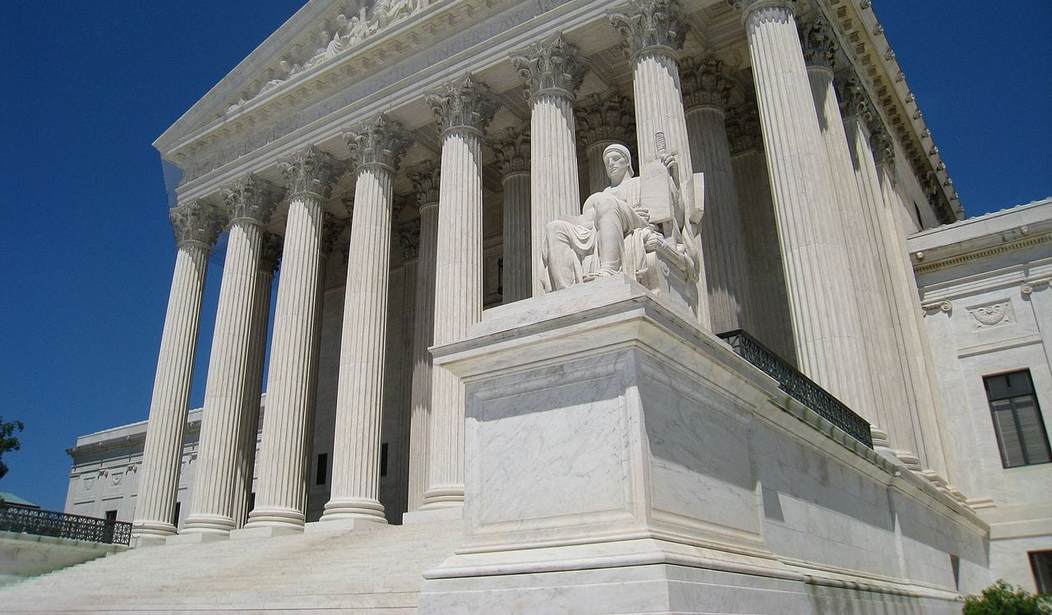On Monday, the Supreme Court announced it would not take up Gavin Grimm v. Gloucester County School Board (2020), a high-profile case concerning whether or not Title IX of the Education Amendments of 1972 forbids schools from designating bathrooms according to biological sex. The school board had allowed single-user restrooms as an alternative to dropping the sex-specific restroom policy, but Grimm challenged it, anyway.
A panel of the Fourth Circuit Court of Appeals ruled in favor of Grimm, a female student who identifies as male and sought to use the boys’ restroom. In the 2-1 ruling, Judge Henry F. Floyd twisted the Supreme Court’s ruling in Bostock v. Clayton County (2020) in order to strike down the school board’s policy.
The Supreme Court had the option of taking up the case and clarifying the issue, but the Court refused to grant certiorari. Justices Clarence Thomas and Samuel Alito voted to take up the case. Neither they nor the Court as a whole issued any opinion explaining their reasoning.
In Bostock, the Court ruled that when Title VII of the Civil Rights Act of 1964 forbids discrimination on the basis of sex in employment decisions, that also forbids discrimination on the basis of sexual orientation and gender identity (SOGI). In a powerful dissent, Alito condemned the ruling as “preposterous” because Congress had tried and failed to amend Title VII in order to include a prohibition of SOGI discrimination and because no one interpreted the law this way until 1971.
Even so, in that preposterous ruling, Gorsuch explicitly stated that the logic of Bostock does not necessarily apply to bathroom cases.
“The employers worry that our decision will sweep beyond Title VII to other federal or state laws that prohibit sex discrimination. And, under Title VII itself, they say sex-segregated bathrooms, locker rooms, and dress codes will prove unsustainable after our decision today. But none of these other laws are before us; we have not had the benefit of adversarial testing about the meaning of their terms, and we do not prejudge any such question today. Under Title VII, too, we do not purport to address bathrooms, locker rooms, or anything else of the kind,” Gorsuch wrote.
Yet Judge Henry F. Floyd cited Bostock in ruling for Grimm.
“After the Supreme Court’s recent decision in Bostock v. Clayton County, we have little difficulty holding that a bathroom policy precluding Grimm from using the boys restrooms discriminated against him ‘on the basis of sex.’ Although Bostock interprets Title VII of the Civil Rights Act of 1964, it guides our evaluation of claims under Title IX,” Floyd wrote.
Floyd subtly admitted that the issue in Grimm’s case is quite distinct from discrimination on the basis of sex.
“At the heart of this appeal is whether equal protection and Title IX can protect transgender students from school bathroom policies that prohibit them from affirming their gender,” he wrote. “We join a growing consensus of courts in holding that the answer is resoundingly yes.”
The law does not forbid discrimination on the basis of “gender” but discrimination on the basis of “sex,” which until yesterday (in historical terms) meant biological sex as male or female.
Gorsuch defended his Orwellian redefinition of language in Bostock by assuring Americans that this ruling did not apply to the bathroom issue, but when the Supreme Court had the chance to correct the record on that very issue, the Court let Floyd’s misinterpretation of Bostock stand. At the very least, if Gorsuch wanted to defend the integrity of his own opinion in Bostock, he would have had to join Thomas and Alito in voting to take up the Grimm case.
Recommended: Alito: Court’s ‘Preposterous’ Trans Ruling Threatens Religion, Speech, Privacy, and Safety
Again, the Grimm case did not involve a completely unreasonable school board. The board had provided single-use restrooms in order to accommodate people who identified as transgender like Grimm. The fact that Grimm nonetheless challenged the policy and that the 4th Circuit nonetheless stuck it down illustrates the true nature of the transgender movement — it’s not about live-and-let-live. This is about control, and forcing gender ideology on Americans through the twisting of decades-old law.
It is shameful that the Supreme Court refused to take up this case. Gorsuch’s silence is also revealing — it seems he used Bostock as a sleight-of-hand. If Gorsuch truly intended not to strike down single-sex bathrooms in that ruling, he should have acted here.









Join the conversation as a VIP Member